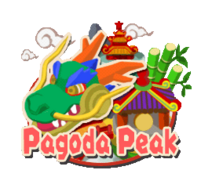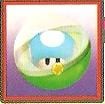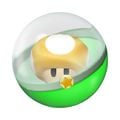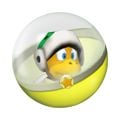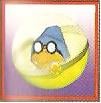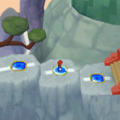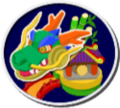Pagoda Peak
| Pagoda Peak | |||
|---|---|---|---|
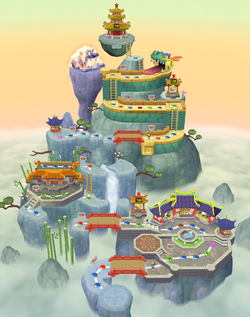 Party Cruise layout 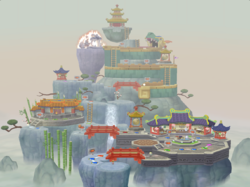 Solo Cruise layout | |||
| Appears in | Mario Party 7 | ||
| Availability | Default | ||
| Description | "Climb to the top of this one-track mountain road!" | ||
| |||
- “Welcome to Pagoda Peak! This mountain is 4,000 years old! You can just smell the history. Right! Head for the mountaintop as you follow the single trail of Pagoda Peak. If you manage to reach the top, Master Koopa will sell you a Star. The price of a Star is 10 coins. Er, well...that's the price at first, you see. Every time someone reaches the peak, the price will go up. Right dreadful, that. Yes, it jumps to 20 coins... And then 30 coins... And so on... But a Star will never be more than 40 coins! I'll bet my dinner on it! Oh, and do stay on your guard. That scoundrel Bowser is out there somewhere!”
- —Toadsworth, Mario Party 7
Pagoda Peak is a board from Mario Party 7 that resembles an ancient Chinese mountain (said to be 4,000 years old) mixed with Japanese buildings. The board consists of a small town, with two dojos including the one at the top of the mountain, and is heavily populated with mountains. Kung Fu Koopas are in charge of the Orb Huts. An old Koopa, named Koopa Master, lives at the top of the mountain.
Objectives
In Party Cruise mode, Koopa Master will give a character who reaches the peak of the mountain a Star for the number of coins shown above his house (10, 20, 30, or 40). Each time someone trades coins for a Star from him, the price of each additional Star will go up by 10 coins (to a maximum of 40 coins); after a Star is bought for 40 coins, it resets back to 10 coins. In Solo Cruise, the winning condition is instead to collect 100 coins and then reach the top of the mountain to trade them with Koopa Master for a Master Koopa T-Shirt.
Events
- Landing on the Green Space near the start lets Toadsworth ask if the player(s) wants to use one of his bottle rockets. Accepting lets the player choose which one to ride on. The character(s) is tied up onto it, and the chosen rocket either takes them to a higher part of the board, or back to the start.
- Landing on a Green Space next to one of the Gongs of Fate causes Koopa Master to appear and lets the player bash the gong to randomly change the price of the current Star. He then gives them coins afterward.
- At the Green Space next to Kung Fu Falls, Koopa Master appears and instructs the player(s) to try and grab the coins that come out of the falls. The player must jump kick between platforms to collect coins while avoiding falling logs. If a player collects all of the coins that appear, Master Koopa gives them a Star (or 50 coins in Solo Cruise).
- The Green Space next to Blazing Rock has the player(s) try and put out the flames with a large fan by pressing the appropriate button(s) repeatedly. If they succeed in putting out the flame, they can enter the cave and come out with a capsule, which may contain coins or even a Star depending on how fast they put the flames out. They can also get a Master Koopa T-Shirt, which is worth nothing.
- Landing on the Green Space on the Chinese dragon's tongue causes it to pull the tongue into its mouth with the player(s) still on it, and it spits them out in a blue fireball, sending them all the way back to the start.
Bowser Time
When Bowser Time occurs, Bowser does one of four things:
- He takes a souvenir photograph of all of the players, and forces each of them to pay 10 or 20 coins for it. He then leaves without giving anyone the photo. This occurs in all other boards except for Bowser's Enchanted Inferno! The backdrop for this board is based on the classic Chinese novel Journey to the West.
- He flattens one of the Orb Huts and replaces it with one of his own (called Bowser City). Koopa Kid stops anyone who goes by, and throws them into the shop, where Bowser sells them a worthless item or a Koopa Kid Orb for twenty coins, which Koopa Kid then either steals or uses. This also occurs in Grand Canal and Pyramid Park.
- He leaps off the mountain and smashes through one of the bridges, leaving players who wanted to cross it stuck; rolls that would normally take players over the bridge stop at the space before it instead. The bridge reappears at the start of the next turn.
- He leaps off the mountain and lands on a lower area, causing a tremor that sends all the players falling to a lower part of the board, similar to the giant tree's sneeze in Towering Treetop in Mario Party 6.
Spaces (Party Cruise)
| Type of Space | Number of Spaces |
|---|---|
 Blue Spaces |
23 |
 Red Spaces |
5 (0 during the last four turns if all Red Spaces turn into Bowser Spaces) |
 Green Spaces |
6 |
 Mic Spaces |
2 |
 Duel Spaces |
3 |
 DK Spaces |
2 |
 Bowser Spaces |
1 (6 during the last four turns if all Red Spaces turn into Bowser Spaces) |
| Total of Spaces | 42 |
Spaces (Solo Cruise)
| Type of Space | Number of Spaces |
|---|---|
 Blue Spaces |
18 |
 Red Spaces |
3 |
 Green Spaces |
4 |
 Mic Spaces |
3 |
 Duel Spaces |
6 |
 DK Spaces |
3 |
 Bowser Spaces |
3 |
| Total of Spaces | 40 |
Orbs
- Metal mushroom Orb.jpg
- Spear guy Orb.jpg
- Pipe Orb.jpg
- Bob-omb Orb.jpg
Gallery
Names in other languages
| Language | Name | Meaning | Notes |
|---|---|---|---|
| French | Pic Pagode[?] | Pagoda Peak | |
| German | Pagodia[?] | - | |
| Italian | Picco Pagoda[?] | Pagoda Peak | |
| Spanish | Pico Pagoda[?] | Pagoda Peak |
Trivia
- There is a real life Pagoda Peak, although it is located not in China, but in Antarctica.
- Not including boards in Solo Mode or Story Mode, with 42 spaces, this is the smallest board in any Mario Party game that follows the traditional gameplay.
- When Bowser Time occurs, Bowser appears on top of the mountain instead of at the start of the board.
